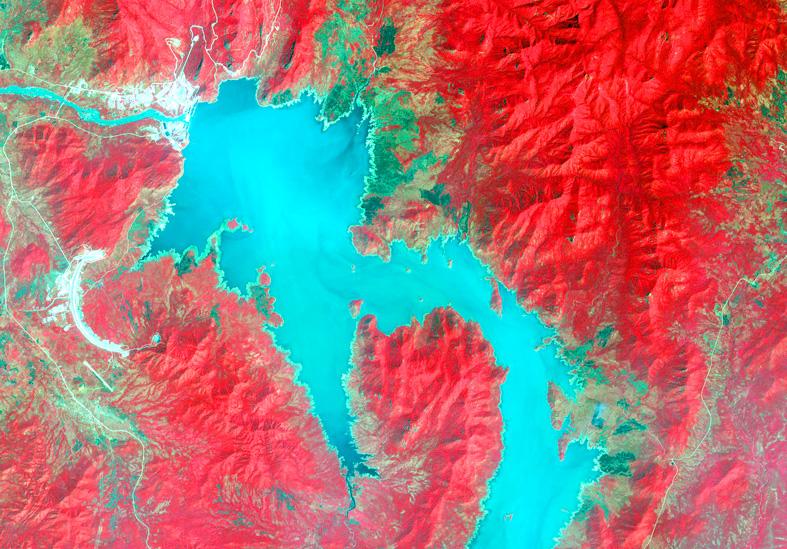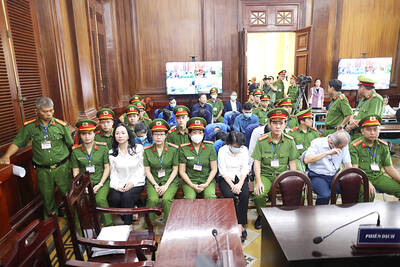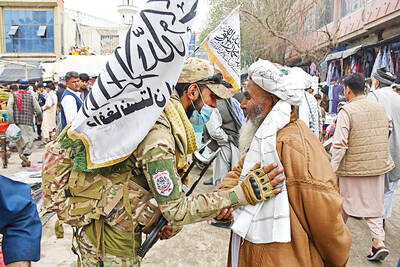Sudan on Saturday boycotted talks between Nile Valley countries over Ethiopia’s controversial mega-dam, calling on the African Union to play a greater role in pushing forward negotiations that have stalled for years.
It was the first time that Sudan refused to attend talks with Ethiopia and its northern neighbor Egypt, which has expressed for years its fears that the Ethiopian Grand Renaissance Dam on the Blue Nile will dramatically threaten water supplies downstream.
Sudanese Irrigation and Water Resources Minister Yasser Abbas said in a statement that the current approach to reaching a tripartite agreement on the filling and operation of Ethiopia’s dam had not yielded results, and the union should do more to “facilitate the negotiation and bridge the gap between the three parties.”

Photo: Reuters
Sudan’s boycott could derail the complicated talks, which the African Union has already taken the lead role in supporting.
On Thursday, the foreign and irrigation ministers of the three Nile Valley countries met online, two weeks after they failed to agree on a new framework for negotiations.
There were no immediate comments from South Africa, which heads the African Union, Egypt or Ethiopia to Saturday’s move by Sudan. It was not clear when they would restart negotiations.
Africa’s largest hydroelectric dam has caused severe tensions with Egypt, which has called it an existential threat and worries that it will reduce the country’s share of Nile waters.
Ethiopia says the US$4.6 billion dam would be an engine of development that would pull millions of people out of poverty.
Sudan, in the middle, worries about the effects on its own dams, although it stands to benefit from access to cheap electricity.
Key questions remain about how much water Ethiopia will release downstream if a multiyear drought occurs and how the three countries will resolve any future disputes. Ethiopia has rejected binding arbitration at the final stage of the project.
As well as tension with its Nile Valley neighbors, Ethiopia was earlier this month plunged into a deadly internal conflict when its federal government launched a military attack on the northern Tigray region’s administration.
The conflict threatens to pull in Ethiopia’s neighbors, which include Sudan, Somalia and Eritrea, whose capital came under rocket attack from the Tigray forces over the weekend. The fighting has sent more than 35,500 Ethiopian refugees into Sudan.
Ethiopia rejected a US draft deal over its dam in February and went on with the first stage of filling of the dam’s massive reservoir, leading Washington to suspend millions of dollars in aid to Addis Ababa.

Republican US lawmakers on Friday criticized US President Joe Biden’s administration after sanctioned Chinese telecoms equipment giant Huawei unveiled a laptop this week powered by an Intel artificial intelligence (AI) chip. The US placed Huawei on a trade restriction list in 2019 for contravening Iran sanctions, part of a broader effort to hobble Beijing’s technological advances. Placement on the list means the company’s suppliers have to seek a special, difficult-to-obtain license before shipping to it. One such license, issued by then-US president Donald Trump’s administration, has allowed Intel to ship central processors to Huawei for use in laptops since 2020. China hardliners

A top Vietnamese property tycoon was on Thursday sentenced to death in one of the biggest corruption cases in history, with an estimated US$27 billion in damages. A panel of three hand-picked jurors and two judges rejected all defense arguments by Truong My Lan, chair of major developer Van Thinh Phat, who was found guilty of swindling cash from Saigon Commercial Bank (SCB) over a decade. “The defendant’s actions ... eroded people’s trust in the leadership of the [Communist] Party and state,” read the verdict at the trial in Ho Chi Minh City. After the five-week trial, 85 others were also sentenced on

‘DELUSIONAL’: Targeting the families of Hamas’ leaders would not push the group to change its position or to give up its demands for Palestinians, Ismail Haniyeh said Israeli aircraft on Wednesday killed three sons of Hamas’ top political leader in the Gaza Strip, striking high-stakes targets at a time when Israel is holding delicate ceasefire negotiations with the militant group. Hamas said four of the leader’s grandchildren were also killed. Ismail Haniyeh’s sons are among the highest-profile figures to be killed in the war so far. Israel said they were Hamas operatives, and Haniyeh accused Israel of acting in “the spirit of revenge and murder.” The deaths threatened to strain the internationally mediated ceasefire talks, which appeared to gain steam in recent days even as the sides remain far

The Taliban’s reclusive supreme leader made a rare public appearance yesterday, an Afghan government spokesman said, leading thousands of worshipers in prayers marking Eid al-Fitr. Hibatullah Akhundzada has made only a handful of public appearances since inheriting the leadership of the Taliban in 2016 and leading the movement back to power with the withdrawal of US forces in 2021. Taliban government spokesman Zabihullah Mujahid said prayer in the largest mosque in Kandahar was “performed under the leadership of the supreme leader.” In a statement on X, he said the early-morning service “was attended by thousands of compatriots” in the southern province considered the